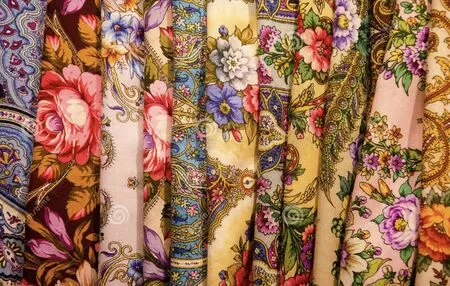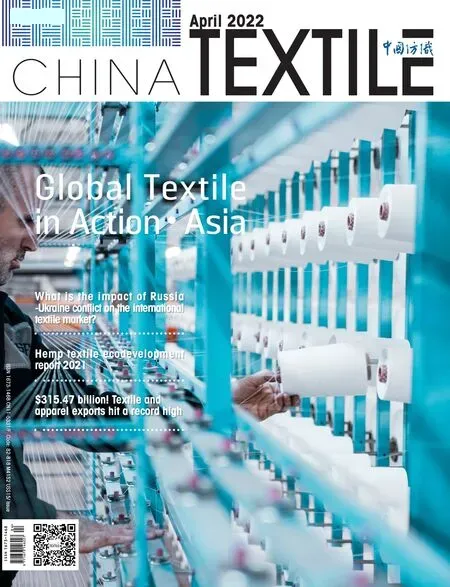What is the impact of Russia-Ukraine conflict on the international textile market?
Edited by Zhao Xinhua

Overview of Russian and Ukrainian textile industry
Russia is the important energy supplier,Ukraine is the world’s grain-producing country,Ukraine issue will no doubt has a major impact on the oil and grain markets in the short term.The price fluctuations of polyester staple fiber caused by oil will further affect the prices of cotton and viscose,the instability of raw material prices will cause certain problems for cotton spinning enterprises to purchase raw materials,and exchange rate fluctuations,sea transportation and land route blocking are undoubtedly major constraints faced by foreign trade enterprises.
Textile industry in Russia
Due to the Soviet Union’s emphasis on heavy industry,the development of light industry was not paid enough attention,and the textile and garment industry was mainly concentrated in Belarus and the Baltic States.The overall output of Russia’s textile and garment industry declined by more than 10 times after the collapse of the Soviet Union.
Supply and demand of textile and garment raw materials
Russia imports most of raw cotton (cotton fiber),mostly from Uzbekistan or Azerbaijan.Russia’s cotton imports totaled USD 487 million in 2020.
Russian hemp and chemical fiber supply is better.Linen production is one of the oldest industries in Russia,but the production and processing has been difficult for years.Jute and sisal for the rope were imported from India.
Russia’s chemical fiber production is growing at 5-6 percent a year and total consumption is growing at 11-12 percent a year.Thus,the share of imports remains high,at least 60 percent.The main importers are Belarus,China,South Korea and India.
Supply and demand of textile and garment semi-finished products in Russia
Russian textile and garment semi-finished products are mainly imported from Asian countries,especially China and India,where cotton fabric and yarn products are low-cost,and Turkey,a country with textile industry as its pillar industry.

Russia is an important export market for China’s textiles and garment,as well as an important region for China to implement export market diversification and“go global” strategy.According to Chinese statistics,due to the pandemic,bilateral trade reached USD 107.77 billion in 2020,down by 2.9 percent year-on-year and exceeding USD 100 billion for three consecutive years.China’s share in Russia’s foreign trade has further increased,and China has remained Russia’s largest trading partner for 11 consecutive years.From 2000 to 2020,China’s textile and garment exports to Russia increased from USD 1.11 billion to USD 7.65 billion in 2020,a cumulative increase of nearly seven times.
Textile industry in Ukraine
Ukraine,with a population of more than 40 million,is the fabric distribution center of Central and Eastern Europe and has the largest physical fabric market in Eastern Europe.
From the perspective of trade,women are the main consumers in Ukraine,with many niche designer brands and strong domestic demand.Ukraine also exports clothing to EU countries and Canada (dutyfree),and exports to Russia through grey channels are also duty-free.The bulk of Ukraine’s fabric comes from China and Turkey.
From the industrial point of view,Ukraine is an old-line garment processing country left from the Soviet Union.Up to now,it still retains a large number of small and medium-sized garment enterprises with relatively cheap labor force and rich technical reserves.There are dutyfree agreements for exports to Canada,Europe,America and Russia.
China’s textile and garment exports to Ukraine were USD 6.8 million in 2019,USD 660 million in 2020 and USD 760 million in 2021,accounting for about 35-40 percent of Ukraine’s imports.China is the largest importer of Ukraine’s textile and garment,while Ukraine’s textile and garment exports are relatively small,with annual exports of about USD 400 million in recent years.Germany,Denmark and Italy are the main markets for Uzbekistan’s textile and garment exports.
The impact of the Ukraine issue on the textile and garment industry
Raw materials are soaring
According to the Ministry of Industry and Information Technology,of more than 130 key basic chemical materials,32 percent of them are still blank and 52 percent are still dependent on imports.Such as high-end electronic chemicals,high-end functional materials,high-end polyolefin,aromatic hydrocarbons,chemical fibers,etc.,and the above products and industrial chain subdivided raw materials are mostly basic bulk chemical raw materials.

China’s more than 30 kinds of chemicals are mainly imported from abroad,part of the degree of dependence is greater,such as adiponitrile,adiponediamine,high-end titanium dioxide,silicone and other high-end monopoly products.Since the beginning of the year,the price trend of these products gradually skyrocketed,the highest price increased by 8,200 yuan/ton,up nearly 30 percent.
The international oil price above USD 100 a barrel
In terms of oil prices,tensions between Russia and Ukraine triggered supply concerns in the crude oil market.International oil prices rose significantly recently,with New York crude futures up 2.90 percent to USD 92.83/barrel.Brent crude futures rose 3.90 percent to USD 97.19/BBL for the first time since September 2014(more than seven years).Brent and WTI crude futures have both breached USD 100 a barrel in recent days,setting new highs.
The recurrence of the pandemic coincides with an escalating geopolitical conflict and a major change in the situation in eastern Ukraine,which has affected the supply of crude oil and natural gas overseas.
According to past experience,crude oil market rises,polyester market will follow! Because crude oil is one of the most important raw materials in polyester industry,the rise and fall of oil price will directly affect the overall profitability of polyester industry.Affected by the 24 crude oil price surge,PTA,ethylene glycol futures rose again,ethylene glycol closed rose more than 100 points,or more than 2 percent,PTA closed rose nearly USD 300,or 5.31 percent.
From the near stage,Ukraine issue affects the markets,crude oil stage rising momentum has been irreversible,the pattern of weak supply and strong demand is still continuing,the market bullish sentiment is not reduced,which will have strong support for polyester prices in the short term,so that the market shipment speed will also accelerate.
Affected by the Ukraine issue,the supply and demand of crude oil is tight,and the price will continue to fluctuate and rise.The market believes that polyester staple fiber will also fluctuate with the price of crude oil,and enterprises can replenish stocks appropriately at low prices.As raw materials rise,downstream polyester yarn will usher in a wave of rising.
- China Textile的其它文章
- Global Textile in Action ? Asia
- India:Measures to boost exports,production,and job opportunities
- Pakistan:The 2022 investment will up to USD 3.5 billion
- Bangladesh:Reasons to promote the growth of textile industry
- Dear readers:
- Japan:Occupy an important position in the high-end textiles field

